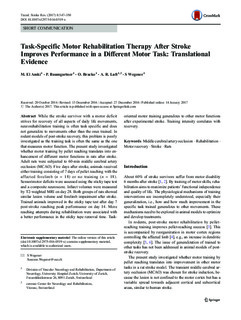| dc.contributor.author | El Amki, M. | |
| dc.contributor.author | Baumgartner, P. | |
| dc.contributor.author | Bracko, O. | |
| dc.contributor.author | Luft, A.R. | |
| dc.contributor.author | Wegener, S. | |
| dc.date.accessioned | 2019-02-27T09:38:12Z | |
| dc.date.available | 2019-02-27T09:38:12Z | |
| dc.date.issued | 2017 | |
| dc.identifier.citation | El Amki, M., Baumgartner, P., Bracko, O. et al. Transl. Stroke Res. (2017) 8: 347. | nb_NO |
| dc.identifier.uri | http://hdl.handle.net/11250/2587713 | |
| dc.description.abstract | While the stroke survivor with a motor deficit strives for recovery of all aspects of daily life movements, neurorehabilitation training is often task specific and does not generalize to movements other than the ones trained. In rodent models of post-stroke recovery, this problem is poorly investigated as the training task is often the same as the one that measures motor function. The present study investigated whether motor training by pellet reaching translates into enhancement of different motor functions in rats after stroke. Adult rats were subjected to 60-min middle cerebral artery occlusion (MCAO). Five days after stroke, animals received either training consisting of 7 days of pellet reaching with the affected forelimb (n = 18) or no training (n = 18). Sensorimotor deficits were assessed using the sticky tape test and a composite neuroscore. Infarct volumes were measured by T2-weighted MRI on day 28. Both groups of rats showed similar lesion volume and forelimb impairment after stroke. Trained animals improved in the sticky tape test after day 7 post-stroke reaching peak performance on day 14. More reaching attempts during rehabilitation were associated with a better performance in the sticky tape removal time. Task-oriented motor training generalizes to other motor functions after experimental stroke. Training intensity correlates with recovery. | nb_NO |
| dc.publisher | Translational Stroke Research | nb_NO |
| dc.rights | Navngivelse 4.0 Internasjonal | * |
| dc.rights.uri | http://creativecommons.org/licenses/by/4.0/deed.no | * |
| dc.subject | middle cerebral artery occlusion | nb_NO |
| dc.subject | rehabilitation | nb_NO |
| dc.subject | motor recovery | nb_NO |
| dc.subject | stroke | nb_NO |
| dc.subject | rats | nb_NO |
| dc.title | Task-Specific Motor Rehabilitation Therapy After Stroke Improves Performance in a Different Motor Task: Translational Evidence | nb_NO |
| dc.type | Journal article | nb_NO |
| dc.source.pagenumber | 347-350 | nb_NO |
| dc.source.volume | 8 | nb_NO |
| dc.source.journal | Translational Stroke Research | nb_NO |
| dc.source.issue | 4 | nb_NO |
| dc.identifier.doi | https://doi.org/10.1007/s12975-016-0519-x | |

